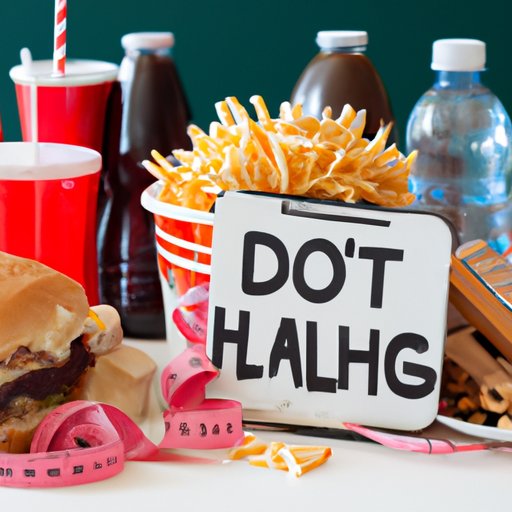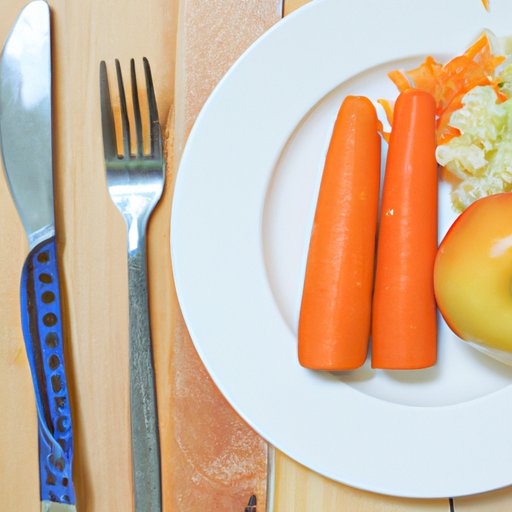Introduction
When it comes to losing weight, one of the most important things to consider is what not to eat on a diet. The right diet plan can make all the difference in helping you reach your health and fitness goals. But with so many different types of diets out there, it can be difficult to know which foods to avoid. In this article, we’ll take a look at 10 of the worst foods to avoid on a diet, as well as some tips from a dietitian on how to make healthier food choices.

10 Worst Foods to Avoid on a Diet
When trying to lose weight, it’s important to avoid certain foods that are high in calories, fat, sugar, and sodium. Here are 10 of the worst foods to avoid on a diet:
1. Fast food
Fast food is usually high in calories, fat, and sodium, and it often contains unhealthy additives. Burgers, fries, and other fast food items are also generally low in fiber and other essential nutrients. If you’re trying to lose weight, it’s best to limit or avoid fast food altogether.
2. Processed snacks and desserts
Processed snacks and desserts, such as chips, cookies, and candy bars, are typically high in calories, fat, and sugar. They often contain artificial flavors, colors, and preservatives, as well. If you’re trying to lose weight, it’s best to avoid these types of snacks.
3. Refined carbohydrates
Refined carbohydrates, such as white bread, white rice, and sugary breakfast cereals, are quickly broken down by the body and can cause spikes in blood sugar levels. These types of carbohydrates are also low in fiber and other essential nutrients. Try to limit or avoid refined carbohydrates when trying to lose weight.
4. Sugary drinks
Sugary drinks, such as soda, energy drinks, and sweetened tea and coffee, are loaded with empty calories and can lead to weight gain. They also contain artificial sweeteners that can have negative health effects. When trying to lose weight, it’s best to limit or avoid sugary drinks.
5. Alcohol
Alcoholic beverages are high in calories and can contribute to weight gain. They also impair judgment and can lead to overeating. If you’re trying to lose weight, it’s best to limit or avoid alcohol altogether.
6. Fried foods
Fried foods, such as french fries and fried chicken, are high in calories and fat. They also contain unhealthy trans fats that can increase the risk of heart disease. Try to limit or avoid fried foods when trying to lose weight.
7. High-sodium foods
High-sodium foods, such as canned soups, processed meats, and frozen dinners, can lead to water retention and bloating. They can also increase blood pressure and raise the risk of heart disease. Try to limit or avoid high-sodium foods when trying to lose weight.
8. Red meat
Red meat, such as beef, pork, and lamb, is high in saturated fat and cholesterol. It can also increase the risk of heart disease and certain types of cancer. Try to limit or avoid red meat when trying to lose weight.
9. Foods high in saturated fat
Foods high in saturated fat, such as butter, cheese, and full-fat dairy products, are linked to an increased risk of heart disease. They’re also high in calories, which can lead to weight gain. Try to limit or avoid foods high in saturated fat when trying to lose weight.
10. Artificial sweeteners
Artificial sweeteners, such as aspartame, saccharin, and sucralose, are often used as a sugar substitute. However, they can have a laxative effect and can lead to digestive issues. They may also have a negative impact on metabolism and can lead to weight gain. Try to limit or avoid artificial sweeteners when trying to lose weight.
A Dietitian’s Guide to Healthy Eating: What to Avoid
When it comes to healthy eating, there are a few general guidelines to follow. Here are some tips from a dietitian on how to make healthier food choices:
1. Choose nutrient-dense foods
Nutrient-dense foods, such as fruits, vegetables, whole grains, lean proteins, and healthy fats, are packed with essential vitamins and minerals. Eating a variety of nutrient-dense foods can help you get the nutrients you need while still limiting calories and fat.
2. Limit processed foods
Processed foods, such as snack cakes, chips, and frozen dinners, are often high in calories, fat, and sodium. They also tend to be low in essential nutrients. Try to limit or avoid processed foods when trying to lose weight.
3. Control portions
Portion control is key when trying to lose weight. Be mindful of how much food you’re eating and try to stick to recommended serving sizes. You can also use smaller plates to trick your brain into thinking you’re eating more than you actually are.
4. Reduce sugar intake
Added sugars, such as those found in candy, cookies, and sodas, can add up quickly and can lead to weight gain. Try to limit or avoid added sugars when trying to lose weight.
5. Avoid unhealthy fats
Unhealthy fats, such as trans fats and saturated fats, can increase the risk of heart disease. They’re also high in calories, which can lead to weight gain. Try to limit or avoid unhealthy fats when trying to lose weight.
6. Limit alcohol consumption
Alcoholic beverages are high in calories and can contribute to weight gain. They can also impair judgment and can lead to overeating. If you’re trying to lose weight, it’s best to limit or avoid alcohol altogether.

Unhealthy Eating Habits to Avoid When Trying to Lose Weight
In addition to avoiding certain types of food, it’s also important to be aware of unhealthy eating habits that can sabotage your weight-loss goals. Here are some of the worst eating habits to avoid when trying to lose weight:
1. Skipping meals
Skipping meals can lead to overeating later in the day, as well as fatigue and low energy levels. Instead of skipping meals, try to eat regularly throughout the day to keep your metabolism going and to prevent overeating.
2. Eating too much
Eating too much can lead to weight gain and can increase the risk of certain health problems. Try to control portion sizes and be mindful of how much you’re eating.
3. Eating out of boredom
Eating when you’re not hungry can lead to weight gain. Instead of eating out of boredom, try to find something else to do, such as taking a walk or reading a book.
4. Eating late at night
Eating late at night can lead to weight gain, as well as indigestion and disrupted sleep. Try to eat early in the evening and avoid snacking after dinner.
5. Eating unhealthy snacks
Snacking on unhealthy foods, such as chips and candy, can lead to weight gain. Instead, opt for healthy snacks, such as fruits and nuts, that are low in calories and high in fiber and other essential nutrients.
6. Emotional eating
Emotional eating, such as eating when you’re stressed or anxious, can lead to weight gain. Instead of turning to food for emotional comfort, try to find healthier ways to cope with stress and anxiety, such as talking to a friend or going for a walk.
The Worst Diet Foods You Should Never Eat
When trying to lose weight, it’s important to be aware of the worst diet foods to avoid. Here are some of the worst diet foods you should never eat:
1. Low-fat or fat-free products
Low-fat or fat-free products, such as yogurt and salad dressings, are often high in sugar and other unhealthy additives. They may also contain unhealthy trans fats. Try to limit or avoid these types of products when trying to lose weight.
2. White bread and pasta
White bread and pasta are refined carbohydrates that can cause spikes in blood sugar levels. They’re also low in fiber and other essential nutrients. Try to limit or avoid white bread and pasta when trying to lose weight.
3. Sweetened cereals
Sweetened cereals, such as frosted flakes and fruity pebbles, are typically high in sugar and low in fiber. They can also lead to weight gain. Try to limit or avoid sweetened cereals when trying to lose weight.
4. Diet sodas
Diet sodas are usually made with artificial sweeteners that can have a laxative effect and can lead to digestive issues. They may also have a negative impact on metabolism and can lead to weight gain. Try to limit or avoid diet sodas when trying to lose weight.
5. Packaged diet snacks
Packaged diet snacks, such as protein bars and granola bars, are often high in sugar and other unhealthy additives. They may also contain unhealthy trans fats. Try to limit or avoid packaged diet snacks when trying to lose weight.
6. Frozen dinners
Frozen dinners are typically high in calories, fat, and sodium. They also tend to be low in essential nutrients. Try to limit or avoid frozen dinners when trying to lose weight.

What Not to Eat: An Expert Guide to Dieting Success
By avoiding certain types of food and unhealthy eating habits, you can set yourself up for dieting success. Here are some general guidelines, meal planning tips, and strategies for making healthy food choices:
1. General guidelines
When trying to lose weight, it’s important to focus on eating nutrient-dense foods, such as fruits, vegetables, whole grains, lean proteins, and healthy fats. It’s also important to limit processed foods, unhealthy fats, added sugars, and alcohol. Finally, be sure to control portion sizes and eat regularly throughout the day.
2. Meal planning tips
Meal planning can help you stay on track with your diet. Start by making a list of healthy meals and snacks that you enjoy. Then, plan out your meals for the week and shop for the ingredients you’ll need. Preparing meals ahead of time can also save you time and money in the long run.
3. Portion control strategies
Controlling portion sizes is key when trying to lose weight. Try using smaller plates to trick your brain into thinking you’re eating more than you actually are. You can also measure out serving sizes to ensure you’re not overeating.
4. Tips for avoiding cravings
Cravings can be hard to resist, but there are ways to manage them. For example, try drinking a glass of water or taking a walk when a craving strikes. You can also distract yourself by talking to a friend or watching a movie.
5. Strategies for making healthy food choices
Making healthy food choices doesn’t have to be complicated. Start by stocking your kitchen with nutrient-dense foods, such as fruits, vegetables, whole grains, lean proteins, and healthy fats. You can also try keeping unhealthy foods out of sight, such as in the back of the pantry or in the bottom drawer of the fridge.
Conclusion
When it comes to losing weight, what not to eat on a diet can make all the difference. While there are many different types of diets out there, it’s important to avoid certain types of food, such as fast food, processed snacks, refined carbohydrates, sugary drinks, and fried foods. It’s also important to be aware of unhealthy eating habits, such as skipping meals, eating too much, and emotional eating. By avoiding the worst foods and unhealthy eating habits, you can set yourself up for dieting success.
(Note: Is this article not meeting your expectations? Do you have knowledge or insights to share? Unlock new opportunities and expand your reach by joining our authors team. Click Registration to join us and share your expertise with our readers.)
